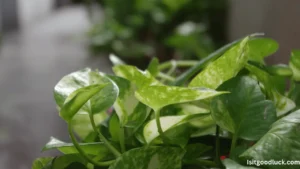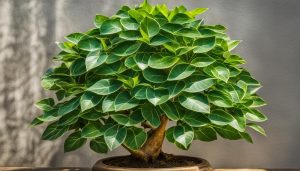Plants have long been revered for their ability to bring positive energy and prosperity into our homes. They not only add beauty and freshness but also have the power to attract good luck and create a harmonious atmosphere. In this article, we will explore a variety of auspicious plants that are believed to bring good luck and positive vibes to your home, making it a happy and prosperous space.
Contents
- 1 Citrus Trees: Symbolizing Wealth and Prosperity
- 2 Ginseng Ficus: Easy-to-care-for Good Luck Plant
- 3 Money Tree: A Symbol of Financial Fortune
- 4 Peepal Bonsai: Symbolizing Good Fortune and Long Life
- 5 Adenium: “Wealth Plants” for Good Luck
- 6 Conclusion
- 7 FAQ
- 7.1 Are all lucky plants suitable for indoor spaces?
- 7.2 Where should I place the money tree in my home?
- 7.3 Do I need any special skills to care for ginseng ficus?
- 7.4 Can I grow citrus trees indoors?
- 7.5 Do rubber plants require any special precautions?
- 7.6 Can I grow peepal bonsai in a pot?
- 7.7 Are adeniums suitable for all climates?
- 7.8 How do these lucky plants bring positive energy to my home?
- 8 Source Links
Key Takeaways:
- Certain plants are considered lucky and bring positive energy to your home.
- Popular lucky plants for the home include citrus trees, ginseng ficus, money trees, peepal bonsai, rubber plants, and adeniums.
- Each lucky plant has specific care requirements, so it’s important to research their needs before bringing them home.
- Plants symbolizing wealth, prosperity, and abundance are often placed in the “wealth corner” of the home, according to feng shui.
- Creating a happy, healthy, and lucky home is possible with the right plants and proper care.
Citrus Trees: Symbolizing Wealth and Prosperity
Citrus trees, such as lemon and orange trees, are considered lucky plants for the home. Their fruits, which are round and gold in color, resemble coins and symbolize wealth. These trees are especially popular gifts during the Chinese Spring Festival, as they are believed to bring prosperity and abundance. Taking care of citrus trees requires specialized care, so it’s important to research their specific care needs before deciding if they are the right choice for your home.
Why Citrus Trees?
Citrus trees have long been associated with wealth and prosperity, making them a perfect addition to any home. They are not only beautiful and fragrant but also bring a sense of abundance and good fortune. The Chinese Spring Festival and Lunar New Year celebrations, in particular, emphasize the importance of these trees as symbols of prosperity and luck. By having citrus trees in your home, you can invite positive energy and financial blessings into your life.
Care Tips for Citrus Trees
While citrus trees can be a rewarding addition to your home, they do require proper care to thrive. Here are some care tips to keep in mind:
- Choose a suitable location: Citrus trees need plenty of sunlight, so select a spot in your home where they can receive at least six hours of direct sunlight each day.
- Water regularly: Citrus trees like moist soil, so make sure to water them regularly, keeping the soil evenly moist. Avoid overwatering or letting the soil dry out completely.
- Provide proper nutrition: Use a balanced citrus fertilizer to ensure your trees receive the essential nutrients they need for healthy growth.
- Prune when necessary: Trim any dead or diseased branches, and shape the tree to maintain its desired form.
By following these care tips, you can enjoy the beauty and symbolic meaning of citrus trees while creating a prosperous and inviting atmosphere in your home.
Ginseng Ficus: Easy-to-care-for Good Luck Plant
If you’re looking for a lucky plant that is easy to care for, the ginseng ficus is a perfect choice. This unique plant, also known as the Ficus microcarpa, is popular in feng shui practices and is believed to bring good luck and positive energy into your home. Its thick, exposed roots and dark green oval leaves make it a visually appealing addition to any space.
Not only is the ginseng ficus considered lucky, but it is also an air-purifying plant. In fact, it is one of the plants that has been scientifically proven by NASA to effectively remove toxins from the air. This means that not only will the ginseng ficus bring good fortune, but it will also contribute to a healthier living environment.
When caring for the ginseng ficus, it’s important to place it in a well-lit area of your home, but avoid direct sunlight. This plant prefers moderate watering and should be allowed to dry out slightly between waterings. With minimal effort and attention, you can enjoy the beauty and luck that the ginseng ficus brings to your home.
| Plant Name | Care Level | Luck Factor | Air Purifying |
|---|---|---|---|
| Ginseng Ficus | Easy | High | Yes |
| Citrus Trees | Moderate | Medium | No |
| Money Tree | Easy | High | No |
| Peepal Bonsai | Moderate | Medium | Yes |
| Rubber Plant | Easy | High | Yes |
| Adenium | Moderate | High | No |
Quotes:
“The ginseng ficus is not only a beautiful addition to your home but also a symbol of good luck and prosperity.” – Feng Shui Expert
“Having a ginseng ficus in your home can bring positive energy and create a harmonious atmosphere.” – Interior Designer
In the world of lucky plants, the ginseng ficus stands out as a visually appealing and easy-to-care-for option. Its unique roots and air-purifying qualities make it an ideal choice for those seeking good luck and a touch of greenery in their lives. Add a ginseng ficus to your home and invite positive energy and prosperity into your space.
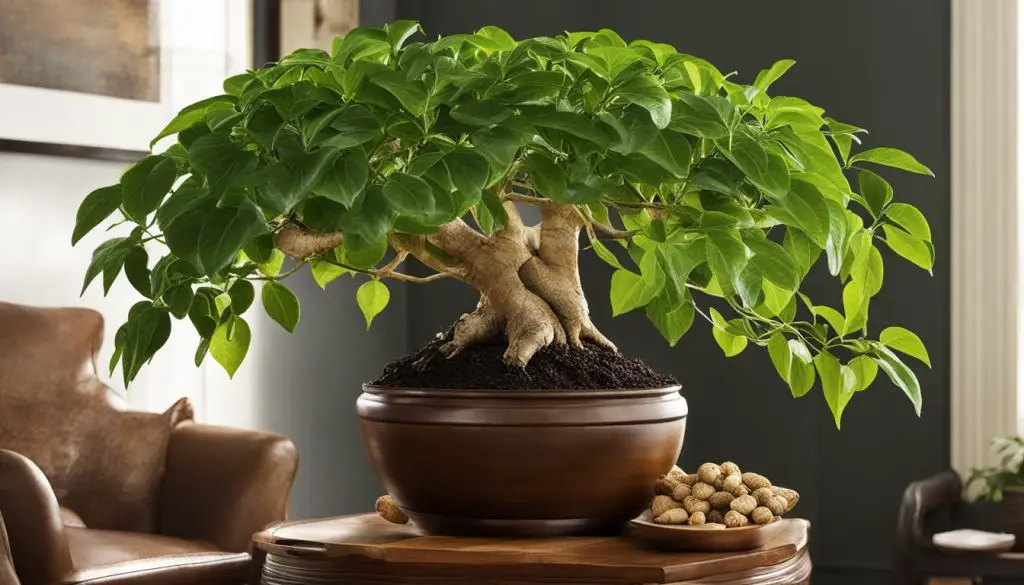
Money Tree: A Symbol of Financial Fortune
The money tree, scientifically known as Pachira aquatica, is a popular choice for those seeking financial fortune and prosperity. According to feng shui principles, placing a money tree in the “wealth corner” of your home, typically the southeast corner, can attract wealth and abundance into your life.
This tropical plant, with its attractive round coin-like leaves, symbolizes prosperity and good fortune. It is believed that the money tree’s resemblance to money can enhance your financial luck. However, it’s important to note that the money tree requires proper care to thrive and bring its auspicious energies into your home.
The money tree, with its lush green foliage and distinct symbolization of wealth, can be a powerful addition to your home’s decor and ambiance. Remember to place it in the wealth corner and provide it with indirect sunlight and regular watering to ensure its growth and prosperity.
To care for your money tree, ensure it receives bright, indirect light to prevent leaf burn. Water it when the top inch of soil feels dry, but be careful not to overwater as this can lead to root rot. Additionally, maintaining a consistent room temperature between 65-75°F (18-24°C) and providing occasional misting to increase humidity can contribute to its overall well-being.
The Wealth Corner:
To maximize the money tree’s luck-bringing potential, it is essential to identify the wealth corner in your home. In feng shui, this is the southeast corner of your space. Placing the money tree in this area is believed to attract abundance and financial opportunities.
In addition to its symbolism of financial fortune, the money tree also offers other benefits. Like many indoor plants, it can help purify the air in your home, improve overall well-being, and create a calming atmosphere. Its lush green foliage brings a sense of freshness and vitality to any space.
| Money Tree Care Tips | Feng Shui Tips |
|---|---|
| – Place in bright, indirect light | – Position in the southeast corner for wealth |
| – Water when the top inch of soil is dry | – Keep the plant healthy and vibrant |
| – Avoid overwatering to prevent root rot | – Remove dead or damaged leaves |
| – Maintain a consistent room temperature | – Clean the leaves with a damp cloth |
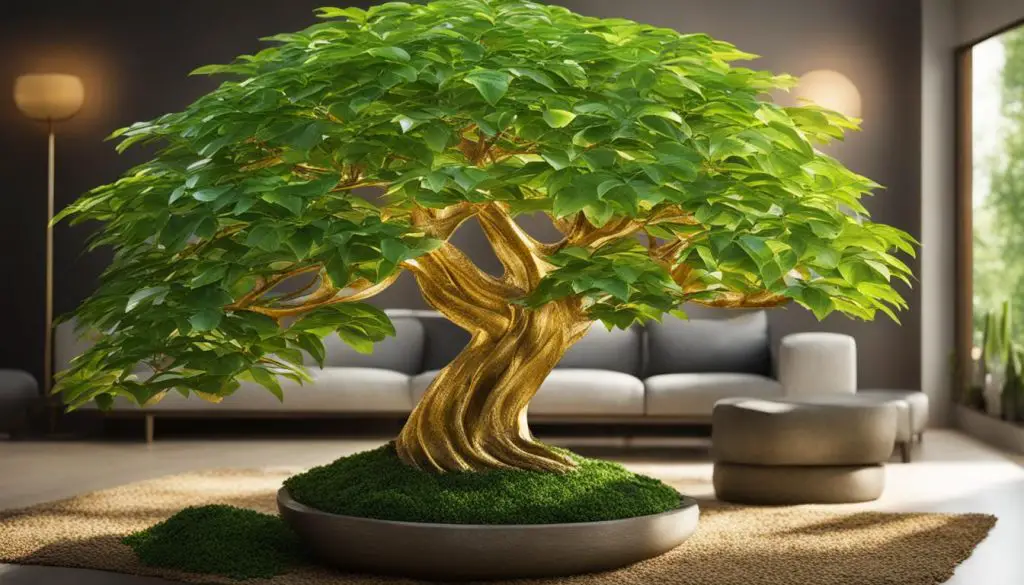
In conclusion, the money tree is a powerful symbol of financial fortune and abundance. By placing it in the wealth corner of your home and providing it with the necessary care, you can invite prosperity and positive energy into your life. Remember to consider its specific care needs, and enjoy the benefits that this auspicious plant brings to your space.
Peepal Bonsai: Symbolizing Good Fortune and Long Life
The peepal bonsai, also known as the Ficus religiosa, is considered a symbol of good fortune, happiness, and long life in both Buddhism and Hinduism. This small version of the peepal tree holds great significance in these ancient religions and is believed to bring blessings to those who cultivate it. If you are looking to invite positive energy and prosperity into your home, the peepal bonsai may be the perfect addition to your indoor garden.
The peepal bonsai is deeply rooted in spiritual traditions. In Buddhism, it is under the peepal tree, also known as the Bodhi tree, that Gautama Buddha achieved enlightenment. This sacred tree represents enlightenment, wisdom, and spiritual growth. Similarly, in Hinduism, the peepal tree is considered holy and is worshiped as it is believed to be the abode of various deities. By having a peepal bonsai in your home, you can connect with these spiritual energies and invite their positive influence into your life.
Caring for a peepal bonsai requires some knowledge and attention. It is important to provide the right balance of light, humidity, and water for the tree to thrive. The peepal bonsai prefers bright, indirect light and needs to be watered regularly. However, it is crucial to avoid overwatering, as it can lead to root rot. Pruning and shaping the bonsai are also important tasks to maintain its miniature form and promote healthy growth.
“The peepal bonsai symbolizes good fortune, happiness, and long life in Buddhism and Hinduism.”
With its rich cultural and spiritual symbolism, the peepal bonsai adds a touch of beauty and positivity to any space. Whether you place it on a windowsill, a meditation corner, or a prominent spot in your living room, this bonsai will serve as a visual reminder of the blessings and abundance in your life. Embrace the tranquility and good fortune that the peepal bonsai represents and allow it to bring a sense of peace and harmony to your home.
| Benefits of the Peepal Bonsai | Care Requirements |
|---|---|
|
|
Embrace the spiritual symbolism and beauty of the peepal bonsai to cultivate good fortune and a sense of tranquility in your home. Keep in mind the care requirements of this unique bonsai to ensure its health and longevity. With proper care and attention, the peepal bonsai will serve as a reminder of the abundance and blessings in your life, bringing joy and positive energy to your sacred space.
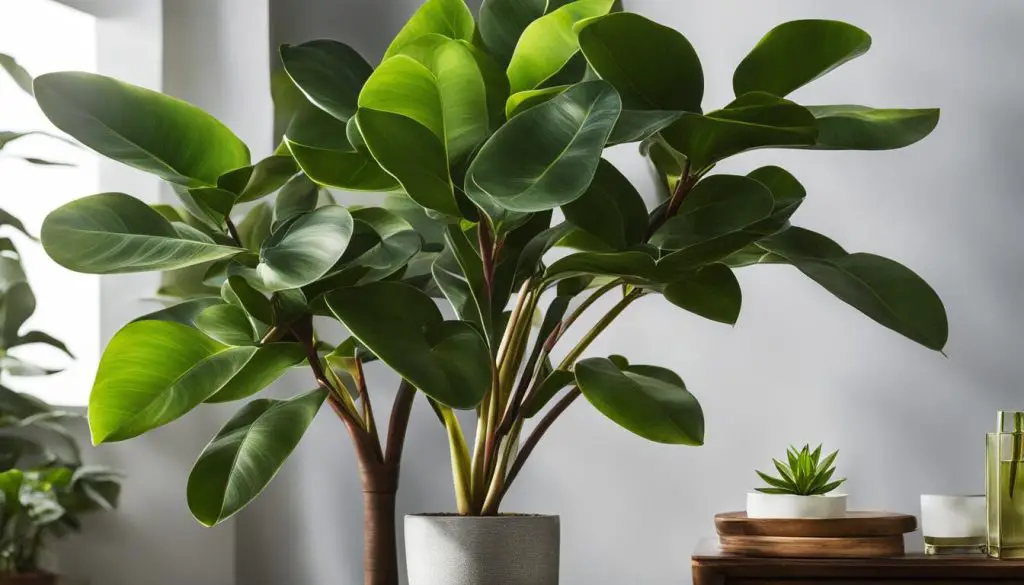
Tips for Caring for a Rubber Plant:
- Place the rubber plant in a well-lit spot with indirect sunlight. Avoid exposing it to direct sunlight as it can burn the leaves.
- Water the plant when the top inch of the soil feels dry. Do not overwater, as it can lead to root rot.
- Maintain a moderate level of humidity around the plant. Mist the leaves occasionally or place a tray of water nearby to increase humidity.
- Keep the rubber plant away from drafts and fluctuations in temperature. It prefers temperatures between 60 to 80 degrees Fahrenheit (15 to 27 degrees Celsius).
- Fertilize the plant every month during the growing season (spring and summer) with a balanced houseplant fertilizer.
By incorporating a rubber plant into your home, you can create an atmosphere of abundance, happiness, and wealth while enjoying the benefits of improved air quality. With its ease of care and captivating foliage, it is sure to bring positivity and vitality to your space.
Adenium: “Wealth Plants” for Good Luck
The Adenium, also known as the desert rose, is a stunning plant that is considered a symbol of good luck and prosperity, particularly during the Chinese Spring Festival. Its unique feature is its swollen roots, which are believed to bring abundance and fertility into the home. Adeniums are known for their beautiful blooms, with the red and pink flowers being associated with extra good fortune.
These plants require a warm climate to thrive and specific care to ensure their well-being. Cold winters and too much shade can weaken them, so it’s important to provide them with ample sunlight and protect them from harsh weather conditions. Adeniums are also drought-tolerant plants that require well-drained soil and infrequent watering.
If you’re planning to bring Adeniums into your home, make sure you have the right conditions to support their growth. They can make stunning additions to your indoor or outdoor spaces, adding beauty, luck, and a touch of elegance to your surroundings.
Conclusion
Adding lucky plants to your home can bring positive energy and create a prosperous atmosphere. Whether you choose citrus trees, ginseng ficus, money trees, peepal bonsai, rubber plants, adeniums, or any other good luck plants, they have the power to enhance the abundance and wealth in your space.
To ensure the health and maximize the positive effects of these plants, it’s important to understand their specific care requirements. Proper watering, lighting, and temperature conditions play a crucial role in maintaining their well-being.
By incorporating lucky plants into your home and giving them the care they need, you can create a harmonious environment that attracts positive energy and promotes a happy and prosperous home.
FAQ
Are all lucky plants suitable for indoor spaces?
Yes, all the plants mentioned in this article can be grown indoors. However, it’s important to consider their specific care requirements and ensure they receive proper lighting and watering.
Where should I place the money tree in my home?
According to feng shui, the money tree should be placed in the southeast corner of your home, also known as the wealth corner.
Do I need any special skills to care for ginseng ficus?
No, ginseng ficus is an easy-to-care-for plant. It requires minimal maintenance and is a great choice for beginners.
Can I grow citrus trees indoors?
While it is possible to grow citrus trees indoors, they have specific care requirements and may not thrive in all environments. It’s important to research their specific needs before deciding to grow them indoors.
Do rubber plants require any special precautions?
Yes, the sap from rubber plant leaves can cause skin irritation, so it’s important to handle them with care. Wash your hands thoroughly after touching the plant.
Can I grow peepal bonsai in a pot?
Yes, peepal bonsai can be grown in pots. However, they require specific care and may need regular pruning to maintain their desired size and shape.
Are adeniums suitable for all climates?
Adeniums thrive in warm climates and may not withstand cold winters or excessive shade. It’s important to provide them with the right environment to ensure their health and growth.
How do these lucky plants bring positive energy to my home?
Lucky plants are believed to attract positive energy and create a harmonious atmosphere. They symbolize abundance, wealth, and good fortune, adding a touch of positivity to your living spaces.



